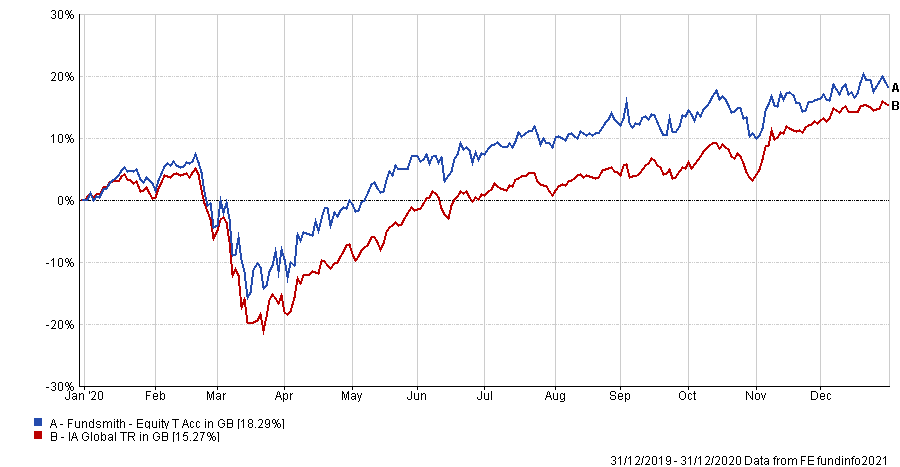Terry Smith has told investors that different sectors of the market could emerge at different trajectories as economies begin to emerge from the Covid-19 pandemic. 
In his annual letter, Smith – manager of the £22.7bn, five FE fundinfo Crown-rated Fundsmith Equity fund – said that in contrast to the views of many other commentators, “it may not be strictly true that the events of 2020 are without precedent”.
There are even some parallels that can be drawn from past pandemics that may act as a guide to what might happen next, the FE fundinfo Alpha Manager said.
One of the lessons from previous pandemics is that they don’t cause new trends, but accelerate existing ones, said Smith (pictured).
“The most obvious comparator — and one which people have most frequently alighted upon — is the Spanish Flu pandemic of 1918–19,” he said.
While the assembly line was not invented as a result of the Spanish Flu pandemic — with the Model T Ford first put on an assembly line in 1913 — it did accelerate its adoption, he explained.
Smith continued: “The death toll of at least 50 million people caused a reduction in the workforce, which may have been a factor in the subsequent widespread adoption of assembly line techniques for mass production.”
The resulting increase in productivity helped to fuel an economic boom as the cost of producing items – such as cars and household electrical appliances – was reduced as the volume of production rose.
“This helped to fuel the economic and stock market boom of the ‘Roaring 20s,” said Smith. “Might something similar happen as a result of Covid?”
The manager said trends that have taken off during the pandemic – such as e-commerce, home cooking & food delivery, online schooling & online medicine, social media & communications and automation & artificial intelligence – have made people more productive.
“Salespeople can visit many more clients if video conferencing is acceptable and at virtually no incremental cost,” he said. “We receive reports of factories which we are told are operating with 50 per cent staffing due to social distancing rules but which have more or less maintained production.
“I wonder what conclusion that leads to?”
Nevertheless, Smith noted that not all companies will benefit from trends that have emerged from the pandemic.
Despite the “meaningless alphabet soup of predictions” about the shape of the economic recovery, Smith said he has found one that may be correct and help to explain what is about to happen.
“A K-shaped recovery occurs when different sectors of the economy emerge from a downturn with sharply differing trajectories — like the arms of the Roman letter K,” he said.
However, Smith also warned against trusting forecasts and timing the market.
He continued: “Imagine if you had been told this time last year that there would be a pandemic and that the measures taken to contain it would so affect the world economy that US GDP would fall by 9 per cent in the second quarter of the year and the hospitality and travel sectors would be devastated by the measures, as would large segments of traditional retail activity.
“Considering this, would you have predicted that the MSCI World index would deliver a return of 12.3 per cent, slightly above its 10-year average?
“Hopefully this illustrates the dangers of forecasting and market timing even when you know what major events will occur.”
Last year, Fundsmith Equity made a total return of 18.29 per cent, outperforming the average IA Global fund's 15.27 per cent gain.
Performance of fund vs sector in 2020

Source: FE Analytics
“Returns on capital and profit margins were lower in the portfolio companies in 2020,” said Smith. “This is hardly surprising in light of events in the economy, but the scale of the falls were hardly disastrous.
“When people have said to us, ‘You invest in non-cyclical businesses’, I always reply that I have never found one. It is the degree of cyclicality in our portfolio which we seek to control through our stock selection.”
He continued: “As a group, our stocks still have excellent returns, profit margins and cash generation even in poor economic conditions… the same cannot be said for the major indices even though they have the benefit of including our good companies.”






